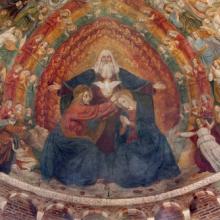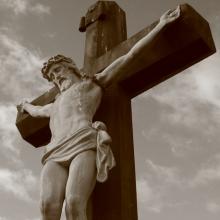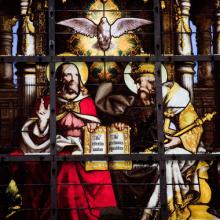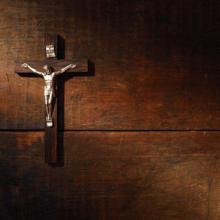trinity
My trans nonbinary identity means freedom to step outside of the gender binary. My gender does not define me first; rather, I am first a human and a beloved child of God. This trans nonbinary identity and my Christian faith have always been intrinsically linked; my experience of queer joy is not separate from the joy I have in my salvation. I think of this joy through a trinitarian lens: At its core, my queer joy is the joy of knowing the Father has created my unique identity and calls it very good, that Christ “queers” or subverts the norms of this world, and that the Holy Spirit is continually forming me to love this world as my full self.
CHRISTIAN MYSTICS HAVE a definite dramatic streak. Their transformative encounters with God are full of divine revelations (Julian of Norwich), ecstatic visions (Teresa of Ávila), stigmata (Francis of Assisi), erotic imagery (John of the Cross), and all manner of artistic compositions (here’s to you, Hildegard of Bingen).
But then there’s Brother Lawrence who — if he is known at all — is known for experiencing God’s presence as he washed dishes, cooked eggs, or did other monotonous chores that came with life in a 17th-century French monastery.
Born Nicolas Herman, he emerged from one of Europe’s deadliest religious wars a disabled veteran. Haunted by his past actions and convinced he was eternally condemned, he failed as a hermit (too much time alone with his thoughts), then as a footman (“a clumsy oaf who broke everything,” he recalled), before eventually joining the lay brothers of the Order of the Discalced Carmelites in Paris in 1640. Yet Brother Lawrence’s anxiety persisted. When he tried to pray, he spent the whole time “rejecting thoughts and then tumbling back into these same thoughts.” Eventually, he gave up all his spiritual exercises and focused on becoming aware of God’s presence as he did his assigned work in the monastery’s kitchen. What he experienced wasn’t a celestial vision, but what he had sought all along: God’s peace.
“We go to such great lengths, trying to remain in the presence of God by so many methods,” he told a friend who posthumously published Lawrence’s modest writings and letters. “Isn’t it much shorter and more direct to do everything for the love of God?”
Carmen Acevedo Butcher, an award-winning translator of mystical and classic Christian texts, was drawn to Brother Lawrence’s gentle practice. Acevedo Butcher herself grew up saddled with severe “self-loathing” and anxiety from a childhood shaped by trauma, hellfire preaching, and the strain of being “a brown girl in a white society.” But in Lawrence’s writing she finds someone who experienced real Love amid real pain.
In Practice of the Presence, Acevedo Butcher’s new English translation of Brother Lawrence, she emphasizes his embodied joy and his “original welcoming spirit,” which she sees in his frequent use of tout le monde — “for everybody.” Drawing on Lawrence’s deeply trinitarian theology, Acevedo Butcher uses they/them pronouns for God, a move she hopes will communicate Lawrence’s kind, inclusive understanding of Love to a wide audience. Acevedo Butcher spoke with Sojourners’ Betsy Shirley about translation, mysticism, and how Brother Lawrence’s practice connects to the work of social justice today.
For decades, people have milked metaphors of baseball and religion beyond what they are worth. It’s not illegal, though there should probably be a special place in hell for those who claim to see the Trinity in baseball’s rule that three outs end an inning, or that the ballpark is a “cathedral.”
The truth is, we can go deeper.
This summer, as has been true for the past few summers, racism has made headline news. Deep divisions have been put in the spotlight, and it can sometimes feel as if that spotlight has served to dig them even deeper.
But we can’t confront racial strife if we don’t acknowledge that it exists. The challenge is that racism does not just have a deep root, but has many deep roots in our lives, communities, and country.
BY THIS TIME in the church calendar, the liturgical highlights feel like they’ve slowed considerably. The excitement of Easter is gone, not to be replaced by another holy season until Advent. Pastors and parishioners, who all stayed away the week after Easter, hopefully have returned. The holy days seem to have drained away into the season of counting the weeks, depressingly named as “ordinary time.”
Ecclesially speaking, however, the holy days are amping up considerably at this point. Easter season hits a crescendo with these latter weeks. The ascension of Christ used to be marked as one of the greatest feast days of the year, up there with Easter, Christmas, and Pentecost. It signifies Christ’s rule over all things, hidden now, to be full-blown and publicly obvious to all in God’s good time. Christ himself insists that he must go away in order that the Advocate would come and, in John’s language, to enable us to do even “greater works” than Jesus ever did. Pentecost is a new outpouring of the triune God to empower the church to do those greater works. There is much here to be celebrated. A crescendo, not a tapering off.
These texts present a reign inaugurated with resurrection in which the poor eat and are satisfied. One built on friendship and common love. It suggests a God who likes getting born enough that God decided to go through the experience and told the rest of us we should go through it all over again. Is that bodily enough for you?
THROUGH THE WRITER of the letter to the Hebrews we will be learning this month how the spiritual environment that upholds us as agents of God’s reign is richly, magnificently peopled. Entering into the spirit of this letter is like finding oneself worshiping in a great Byzantine church, in which the walls are blazing with frescoes and mosaics depicting the history of salvation and the saints in all their glorious variety. The writer extols the lineage of witnesses to God down the ages. We are asked to recognize them all as a crowd of supporters cheering us on. The writer insists that we live in vibrant awareness of the great and all-embracing community that God is forging. “But you have come to Mount Zion and to the city of the living God, the heavenly Jerusalem, and to innumerable angels in festal gathering, and to the assembly of the firstborn who are enrolled in heaven, and to God the judge of all, and to the spirits of the righteous made perfect, and to Jesus, the mediator of a new covenant” (Hebrews 12:22-24).
This is the antithesis of the bizarre theory that “religion is what the individual does with his own solitariness,” as the philosopher Alfred North Whitehead claimed. God is communion, as we try to express it in the doctrine of the Trinity. Life is interrelatedness. The baptismal creed of the church commits us to belief in the communion of saints because God recruits us for the struggle to build, sustain, and nurture community-where-God-reigns here on earth, as it is in heaven.
"God doesn't just hate what you do. God hates who you are." — A Well-Known Contemporary Preacher
What this pastor says above, as well as much of what he says in the sermon from which this line is taken, comes from reading the Bible as if every sentence in it can and should be read as bearing the same weight as all others when we answer the question: "Who is God?"
When we read the Bible with the first Christians we begin to understand that the way they read these texts is not the way an uber-rationalist modern reads them.
Since Jesus himself was the one who taught the apostles to read the Old Testament, the way the churches they founded read the Bible is important for us, too.
God never was only the words he utters, or the ones we utter about God — just like we are never the sum total of everything we have spoken or what has been spoken of us. There is so much more to the mystery of any person than mere words; how much more so the mystery of the divine persons.
I WAS BROUGHT UP up on stories of my family's emigration to Russia from England in the 1850s and of the three generations we lived there and intermarried. My grandparents fled the upheavals of revolution in 1917, returning to England. Having drunk deeply from the springs of Russian spirituality, it is second nature to me to hear the scriptures with Russian ears. As Eastertide culminates at Pentecost (rounded out in the wonderful coda of Trinity Sunday), I find myself murmuring as a mantra the great injunction of St. Sergius of Radonezh, "Beholding the unity of Holy Trinity, to overcome the hateful disunity of this world!" The doctrine of the Trinity is no mere antiquity, but a beacon pointing to the future that God desires for the world. In the Trinity, "hateful disunity" can be transformed into life-in-communion; our life together as human beings incarnating our identity as ones made into the image and likeness of God. I will find myself doodling on my notepad the provocative claim of the Russian lay theologian Nikolai Fedorov: "Our social program is the dogma of the Trinity."
Taking in again the Trinitarian grammar of our prayer and faith, I will find myself reinvigorated for the task of forging a spirituality that, as a great Anglican priest Alan Ecclestone wrote, "takes its Trinitarian imagery more seriously than ever before, relating the creativity, the humanizing, and the unification of [humankind] in one growing experience of mutual love." This from a man who was a passionate political activist writing from the thick of gritty urban politics, not from an ivory tower.
The first Christians confessed that Jesus is "God from God, light from light, true God from true God." Jesus is, they finally confessed after centuries of dispute, who the Gospels and the apostles plainly tell us: God without qualification. Bethlehem's baby boy grew to be the man from Nazareth, who is also from before time and forever the only begotten Son.
Jesus tells Philip that he and the Father are one; that if Philip has seen Jesus, then Philip has seen the Father. Paul tells the Colossians that Christ is the visible image of the unseen God. The Hebrews are taught by their apostle that Jesus bears the very stamp of God's nature.
If anything we think we knew about God before Jesus arrives in Mary's womb contradicts what we see and hear of Jesus in the Gospels, then we are the ones who are mistaken, the ones who weren't paying close enough attention before he came (yes, Jesus reveals the same relationship-initiating God of holy love we encounter in the pages of the Hebrew Bible); we are the ones who have, since his decades of extravagant humility among us as one of us, forgotten the Christ.
I read a lot of Trinitarian theology last semester at Duke Divinity school, most of it trying to discern how believing in a Triune God might affect the way people of different religious faiths relate to one another. The other great Monotheisms, Islam and Judaism, of course reject the Trinity as they reject Jesus as divine. But what if the Christian belief in the Triune God is the very basis on which Christians can accept Jews as Jews, Muslims as Muslims, and atheists as atheists? Different theologians have explored how the Trinity might be a good place to ground a Christian theory of religious pluralism. S. Mark Heim has gone so far as to say that God’s own inner diversity shows God’s intention for a diverse humanity, even including religious diversity. In other words: People might believe in a non-Trinitarian God because they were made by a Trinitarian God. Mind-blowing.
I wasn’t expecting to find resonance in Charles Darwin, whose name has been used in so much anti-religious fervor. But in his 1857 letter to Asa Gray, Darwin wrote about the “principle of divergence” and how “the same spot will support more life if occupied by very diverse forms.” We might not want to make a precise analogy to human society when Darwin concludes that “each new variety or species, when formed will generally take the place of and so exterminate its less well-fitted parent.”
That line of thinking could easily lead us to euthanasia. But, taken with his observation that diversity fosters life, we might say that co-existence with others forces a species to adapt, and everyone is better for it. Consider the converse of Darwin’s statement: The same spot will support less life if occupied by a unitary form. There is something life-giving – Heim might say “divine” – about difference.
"NO ONE SPEAKING by the Spirit of God ever says, 'Let Jesus be cursed!'" insists Paul in his first letter to Corinth (12:3). Driving through Corinth not long ago, I found myself musing about the extraordinary spirituality that had grown up in the church he was trying to straighten out. Apparently, ecstatic worshippers caught up in charismatic excitement on the Lord's day were actually known to blurt out these shocking words: "Anathema, Jesus!" In a very brief period, the church there had come up with a mutation of the gospel in which only the cosmic, exalted savior, known through speaking in tongues and exciting miracles, mattered. The earthly person of Jesus of Nazareth had been a mere husk to be shucked off, they said. Only the Spirit-giving celestial Lord mattered. Jesus be damned! His teachings back in Galilee signified nothing; now they could concentrate on the prophecies that came hot and strong from heaven through the church's prophets—a belief that left plenty of room for all sorts of wild ethical "experiments," to put it mildly.
Well, no one actually utters "Let Jesus be cursed" out loud anymore, but, in a more subtle way, how prevalent is a pseudo-spirituality that relativizes the radical teaching of the reign of God! These readings bring us back under the authority of Jesus' witness in Galilee—and the reality that there is no Spirit, and no spirituality, except the one we receive as the driving energy to bring good news to the poor.
Tony Jones has asked some of us progressive Theobloggers to chime in on God, you know, perhaps some kind of definition or doctrine (that word many of us progressives despise). You can read his invitation here. Tony doesn't want us to talk about Jesus, per se, but about God. I get that. He's in his evangelical context and he gets tired of all the Jesus talk. Lately it seems that the Emergent conversation has been all Jesus all the time. Now, that doesn't bother me, but then again I feel that in my end of the progressive mainline (free church progressive) we don't talk about Jesus enough. We talk about God all the time. Jesus, well, he's a bit of an enigma. What else is there to say? Nevertheless, Tony's invitation is an interesting one and I'm willing to chime in.
One caveat: I'm doing this as a way to speak of one Person of a Trinity. To speak of the One is, in many ways, to speak of the Three and the Unity. But this is just a blog post and not a 20-page essay. So ... yeah.
My answer: If you want to know God, get Religion. (Have you got good religion? Certainly, Lord!) Religion is a combined set of activities embodied by people. These activities are not limited to but may include the following behaviors: liturgy, charity, politics, and even theology (mystical and systematic), and doctrine. Religion can be communal or individual. Religion is the principal craft by which we know (cognition) and understand (hermeneutics) God.
A dear friend recently reminded me of David Ford’s gem of a book, The Shape of Living: Spiritual Directions for Everyday Life. On the back cover, Nicholas Wolterstorff describes it beautifully: “[This book's] spirituality is profound and reflective, yet always concrete, and never dishonest or evasive; it uses not only Scripture but literature with creative facility. Simple, yet rich. A jewel of the spiritual life in its everyday manifestations. I want to savor it with repeated readings.”
Ford traces the “multiple overwhelmings” in our lives — the forces that shake us and shape us, those with the power to wound or crush and those that are life-giving and transformative. At stake in reckoning with such tumult is the whole of our lives and our living. “How,” he asks, ”in the midst of all our overwhelmings, are our lives shaped?”












